Several weeks ago, I received this tweet:

<GULP> PETA?!? That is one word farmers don’t like to hear. It’s no secret that they are a radical animal-rights extremist group and no friend to farmers. But I decided to do some digging. Who is this David Smalley guy?
Upon my digging I realized we had mutual friends who helped ease my fears. No, David isn’t a crazy animal-rights extremist vegan…. just a guy with a popular podcast who talks to people from all walks of life who have very differing viewpoints on hot topics. The name of the podcast is perfectly fitting: Dogma Debate. Can you challenge your dogma? When was the last time you changed your mind from your firmly held beliefs?
David didn’t put the pressure on but put the offer out there — “Listen to the episode and then decide if you want to come on my show,” he said after we had a phone call.
Boy, am I glad I did. Upon listening to the episode where he had a guy from PETA on his show, I took five pages worth of notes and left shaking my head at how wrong this guy was. PETA in no way tells the truth of animal agriculture. They have an agenda — to get people to stop eating meat and stop using animals for anything, period. In my opinion, there’s nothing wrong with someone who chooses that lifestyle, but don’t spread lies and fear for fundraising in the process.
I agreed to go on the show, but it wasn’t an easy decision. Animal-rights extremist groups have been known to give death threats to farmers. I’ve had awful experiences with these extremists, as have many other people in my situation. BUT — I thought — if I don’t tell the story of animal agriculture on this popular Los Angeles-based podcast, who will?
David packed up his family in his car from LA to our farm in Iowa where they toured our beef and lamb farm and area dairy and pig farms. It wasn’t easy to get farmers to open their barn doors once they see the word PETA on anything affiliated (understandably so!), but we eventually made it work once I eased everyone’s minds on how David wasn’t a threat to us in animal agriculture. They just want to learn more. One of the pig farms we toured produces 800,000 pigs per year! David and his family had never been to a farm before, so I took them from zero to 100 pretty quickly — it was a life changing experience for them. We had a great time.
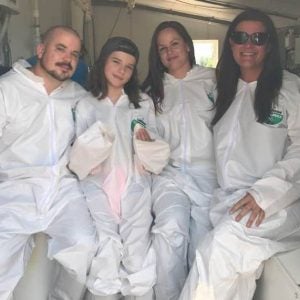
We were greeted on one pig farm by an awesome team of people — the family farmers, upper management, social media and marketing folks, the manure management guys and agronomists, and the veterinarian. We were so grateful that they took the time out of their schedule to spend the day with us and teach us all about their role on the farm. We saw everything from where the sows are housed for giving birth, all the way up to the pigs that are finished for market. This farm has it all, with 150 employees and some of the best barn technology around.
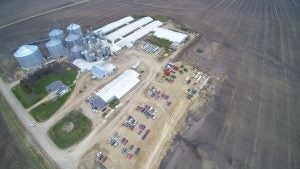
Some of the barns have curtains that automatically go up and down depending on the weather and temp. Other barns have a very tech savvy air filtration system that keep the airflow going and clean. There are slats in the floor for their manure to fall through so the pigs are kept clean, healthy, and dry. The manure is stored until its ready to be spread on the fields through a several hundred page, very expensive manure management plan regulated by the Department of Natural Resources. One thing I noticed was that the smell on the farm wasn’t that bad at all. Everything is sanitized, including the trucks used for transport. All the pigs have records kept by the vet — vaccine innovation has made it so many pigs are raised with no antibiotics, ever. Biosecurity has reduced risks of disease. Pig care on farms always comes first, and these guys really do a great job.
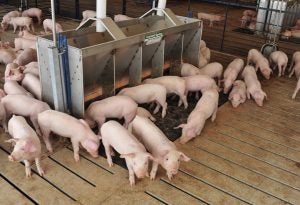
These are the things that organizations like PETA, Mercy for Animals, or HSUS don’t want you to know. They would like you to believe that this is a cruel, “factory” farm where they are raised in torturous conditions. It’s easy to raise sensationalism on a topic that a vast majority of people are far removed from, but what they say about animal agriculture couldn’t be further from the truth. They don’t take care of these animals for a living — farmers do. And we know what’s best.
As I’ve written about here, 97 percent of farms are family owned, and we shouldn’t judge a farm by its cover or make assumptions based purely on its size. Big doesn’t mean bad when it comes to farming. Farms have advanced; they’re bigger than they used to be, sure. But that doesn’t mean the farmer’s values have changed. It just means that farmers today are able to do a better job. Years ago when pigs were raised outdoors, they were prone to disease, predators, extreme weather temps, ice and snow, frozen waterers, higher mortality rates, etc. Not only that, but back then before manure pits existed and the manure sat outside, what would happen during a heavy rain? What if the farm sat on a hill? You guessed it: runoff and pollution. All of this can be better managed thanks to technology. I’m sure smaller farms wish they could afford this awesome technology, which makes life for the farmer and the animal much better … myself included.
After this we toured a modern free stall dairy barn with robotic milkers, automatic manure scrapers, “Fitbit”-type data-driven collars that track about 180 different data points on the cow. The cows also have misters and back scratchers — they even lay in sand! Nutrition plans are carefully selected on all farms, to ensure the best diet for breeding or growing, depending on the animal and what’s going on with them.
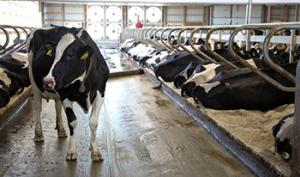
We then finished off doing the podcast on our farm, where we also did a 360-degree video from one of our cattle pens. I highly recommend you guys listen to this podcast. It’s kind of long, but we cover all the hot topics in agriculture, and it’s very informational and fun! Merging the farm life with the city life is something I’m really passionate about, and I hope it shows. Enjoy!
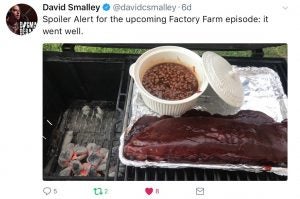
Michelle Miller, the Farm Babe, is an Iowa-based farmer, public speaker and writer, who lives and works with her boyfriend on their farm which consists of row crops, beef cattle, and sheep. She believes education is key in bridging the gap between farmers and consumers.



